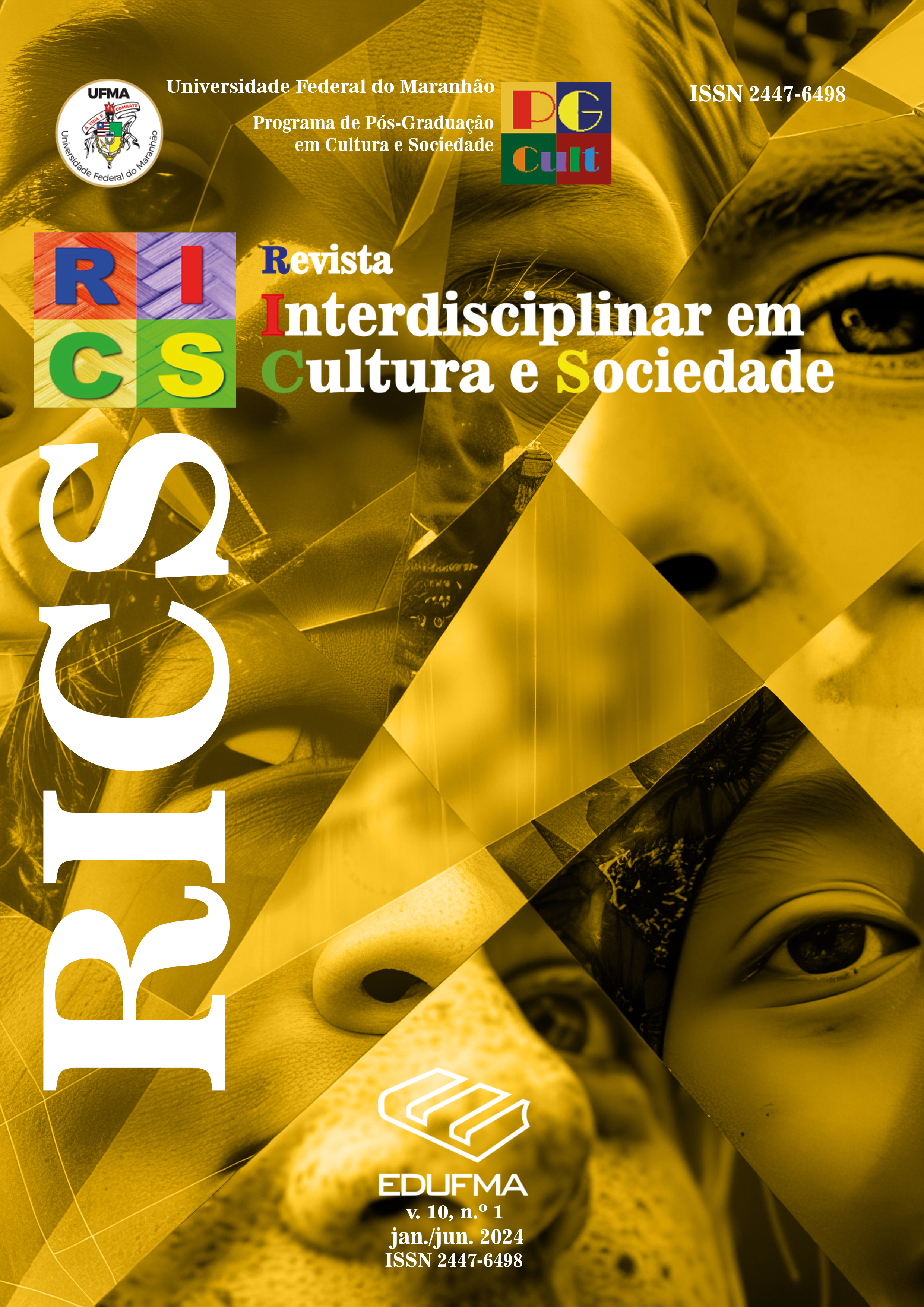Inclusão social
A communitas no centro do desenvolvimento comunitário
DOI:
https://doi.org/10.18764/2447-6498.v10n1.2024.3Palavras-chave:
Inclusão Social., Comunidade., Desenvolvimento Comunitário., Sentimento de pertença.Resumo
A inclusão social implica humanizar o desenvolvimento, aumentando a coesão social e a criação de vínculos entre as pessoas e os grupos. Quando a comunidade sente que tem direitos e potencialidades, ativa processos participativos na procura pela transformação social. Com o estudo que aqui se apresenta, pretendeu-se conhecer o modo como a comunidade de Vale Domingos perceciona a importância do Parque Botânico de Vale Domingos (PBVD) no aumento do sentimento de pertença à comunidade. Objetivou-se, igualmente, perceber quais as estratégias que permitiram a mobilização e o envolvimento da comunidade local, bem como, compreender a forma como esta comunidade perceciona a importância do PBVD na construção da identidade local e do sentimento de pertença. Como estratégia metodológica, optou-se pelo estudo de caso, tendo sido utilizadas como técnicas de recolha de dados o inquérito por questionário à comunidade e entrevista semiestruturada a informadores-chave. Pelos dados apurados, pode-se afirmar que o PBVD assume o papel central na construção do sentimento de pertença da comunidade Vale Domingos e é reconhecido pelas pessoas como elemento crucial de inclusão social, cidadania e transformação social.
Downloads
Referências
ABRANTES, Pedro. Para uma teoria da socialização. Sociologia, Revista da Faculdade de Letras da Universidade do Porto, Porto, v. 21, p. 121-139, maio, 2011.
ALLEGRETTI, Giovanni; GARCÍA LEIVA, Patrícia; PAÑO YÁNEZ, Pablo. Viajando por los presupuestos participativos: buenas prácticas, obstáculos y aprendizajes. Málaga: CEDMA, 2011.
AMADO, João (Coord.). Manual de investigação qualitativa em educação. Coimbra: Imprensa da Universidade de Coimbra, 2017.
AMARO, Rogério Roque. Desenvolvimento—um conceito ultrapassado ou em renovação? Da teoria à prática e da prática à teoria. Cadernos de estudos africanos, Lisboa, V.4, p. 35-70, jun. 2003.
ANDER-EGG, Ezequiel. Metodologia y Práctica del Desarrollo de la Comunidad. Buenos Aires: El Ateneo, 1982.
BAUMAN, Zygmunt. (2005). Vidas Desperdiçadas. Rio de Janeiro: Jorge Zahar Editor, 2005.
CABANNES, Yves. (2004). 72 Perguntas Frequentes sobre Orçamentos Participativos. Caxias do Sul: UN-HABITAT, 2004.
CARMO, Hermano. (coord). Problemas sociais contemporâneos. Lisboa: Universidade Aberta, 2002.
CASTEL, Robert. The roads to disaffiliation: Insecure work and vulnerable relationships. International journal of urban and regional research, s.l., v. 24, n. 3, p- 519-535, jun. 2008.
CASTEL, Robert. A dinâmica dos processos de marginalização: da vulnerabilidade a desfiliação. Caderno CRH, Salvador, v. 10, n. 26, p. 19-40, set. 2006.
COLAÇO, João Carlos. Pobreza e exclusão social – problematização e dinâmica na sociedade moçambicana. In: ARRUDA, R.; COLAÇO, J.; BAIA, A. (org.) O que é a exclusão social?. Forte da Casa: Escolar Editora, 2014. p.32-56
COSTA, Alfredo Bruto. Exclusões sociais. Lisboa: Gradiva, 1998.
COSTA, Alfredo Bruto. Prefácio. In: DIOGO, F.; CASTRO, A.; PERISTA, P.; SILVA, M.C. (orgs). Pobreza e exclusão social em Portugal: contextos, transformações e estudos. Edições Húmus, 2015. p. 7-16.
DIOGO, Fernando; CASTRO, Alexandra; PERISTA, Pedro (org.) Pobreza e exclusão social em Portugal: contextos, transformações e estudos. Ribeirão: Edições Húmus, 2015.
FINGER, Matthias; ASÚN, José Manuel. A educação de adultos numa encruzilhada: aprender a nossa saída. Porto, Porto Editora, 2003.
FRAGOSO, António. Desenvolvimento Participativo: uma sugestão de reformulação conceptual. Revista Portuguesa de Educação, Braga, v. 18, n. 1, p. 23-51, 2005.
FREIRE, Paulo. Conscientização. São Paulo, Ed. Cortez & Morães, 1979.
FREIRE, Paulo. Pedagogia dos Sonhos Possíveis. São Paulo: Editora UNESP, 2001.
GODOY IZQUIERDO, Débora; GODOY GARCÍA, Juan; LÓPEZ-CHICHERI GARCÍA, Isabel; MARTÍNEZ DELGADO, Antonio; GUTIÉRREZ JIMÉNEZ, Susana; VÁZQUEZ VÁZQUEZ, Luisa. Propiedades psicométricas de la Escala de Autoeficacia para el Afrontamiento del Estres (EAEAE). Psicothema, Oviedo, v. 20, n. 1, p. 155-165, abr. 2008.
IONESCU, Cornel. About the conceptualization of social innovation. Theoretical and Applied Economics, Autumn, v. 22, n. 3, p. 53-62, maio 2015.
HOCKERTS, Kai. The social entrepreneurial antecedents scale (SEAS): A validation study. Social Enterprise Journal, s.l., v. 11, n. 3, p. 260-280, novembro, 2015.
HUME, David. Investigações sobre o entendimento humano e sobre os princípios da moral. São Paulo: Editora UNESP, 2004.
LEIVA, Patrícia Garcia. Psychological Empowerment in Participatory Budgeting. In: DIAS, N. (ed.). Hope for Democracy: 25 years of Partcipatory Budgeting Worldwide. S. Brás de Alportel: In Loco Association, 2014. p. 443-451.
LEWIS, Michael. Self-conscious emotions: Embarrassment, pride, shame, and guilt. In: LEWIS, M.; HAVILAND-JONES, J. M.; BARRETT, L. F. (Eds.). Handbook of emotions. New York: Guilford, 2008. p. 742–756.
MAIA, Sara Vidal; BAPTISTA, Maria Manuel; MARTINS, Moisés Lemos. Quando a análise de conteúdo “vai mais além”: análise de textos escritos por mulheres n'O Ilhavense. In: PINTO-COELHO, Z.; RUÃO, T.; ZAGALO, N. (eds.). Arte, políticas e práticas. Braga: Universidade do Minho. Centro de Estudos de Comunicação e Sociedade, 2017. p. 161-184.
MARGONI, Catherine Cavalcanti; MENEGUEL, Cinthia Rolim Albuquerque. (2019). A memória coletiva do idoso e a sua parceria com a inovação social do turismo de Santos. In: MATOS, P.; LOPES, D.; MUYLDER, C. (eds.). Inovação Social – Casos na Comunidade de Países de Língua Portuguesa. Coimbra: Edições Almedina, S.A, 2019. p. 17-50.
MARQUES, Rui. Líderes Ubuntu a três tempos-cuidar, ligar e servir. In: Academia de Líderes Ubuntu. Construir Pontes Ubuntu-Para uma liderança servidora. S.l: Academia de Líderes Ubuntu, 2019. p.69-104.
MOYSÉS, Lúcia. A autoestima se constrói passo a passo. São Paulo: Papirus Editora, 2014.
MULGAN, Geof; ALI, Rushanara; HALKETT, Richard; SANDERS, Ben. In and out of the sync: the challenge of growing social innovation. s.l.: NESTA – National Endowment for Science, Techonology and the Arts, 2007.
NASCIMENTO, Elimar Pinheiro (2000). Dos excluídos necessários aos excluídos desnecessários. In: BURSZTYN M. (org.). No Meio da Rua-Nômades, Excluídos e Viradores. Rio de Janeiro: Editora Garamond, 2000, p. 56-87.
PATTON, Michael Quinn. Qualitative evaluation and research methods. S.l: SAGE Publications, inc., 1990.
PAULA, Ricardo. Visíveis e Invisíveis – inquietações e fragilidades no dilema da inclusão e da exclusão social. In: ARRUDA, R.; COLAÇO; J.; BAIA, A. (coord.). O que é a exclusão social?. Forte da Casa: Escolar Editora, 2014, p. 14-30.
RAHNEMA, Majid. Participation. In: WOLFGANG, S. (ed.) The Development Dictionary. A Guide to Knowledge as Power. 2 ed. London & New York: Zed Books, 2010. p.127-144
SANTOS, Boaventura Sousa. A construção multicultural da igualdade e da diferença. Coimbra: Centro de Estudos Sociais, 1999.
SARASON, Seymour. The psychological sense of community: Prospects for a community psychology. Brookline: Brookline Books, 1974.
SEN, Amartya. Equality, Equality of What? The tanner lecture on human values, delivered at Stanford University, maio, 1979.
SINTOMER, Yves; HERZBERG, Carsten; ALLEGRETTI, Giovanni; RÖCKE, Anja. Aprendendo com o Sul: O Orçamento Participativo no Mundo-um convite à cooperação global: Estudo. Diálogo Global, Bona, v.25, p. 1-81, mar. 2012.
SOUSA, Jenny. A animação artística na construção de um envelhecimento mais ativo criativo. In: SOUSA, J.; SANTOS, M. J.; MAGUETA, L.; LOPES, M. D. S. P.; BRITES, L. (coords.). Emoções, Artes e Intervenção-Perspetivas Multidisciplinares. Coimbra: Almedina, 2021. p. 143-153.
TALPIN, Julien. Schools of Democracy: How ordinary citizens become competent in Participatory Budgeting Institutions in Europe. In: DALY, K.; SCHERGURENSKY, D.; LOPES, K. (eds.). Learning Democracy by Doing: Alternative Practices in Citizenship learning and Participatory Democracy. Toronto: Transformative Learning Centre, 2009. p. 682-694.
TRACY, Jessica; ROBINS, Richard. The psychological structure of pride: a tale of two facets. Journal of personality and social psychology, v. 92, n.3, p. 506 -525, mar. 2007.
TUCKMAN, Bruce. Manual de Investigação em Educação. Lisboa: Fundação Calouste Gulbenkian, 2012.
TURNER, Edith. (2012). Communitas: A antropologia da alegria coletiva. S.l: Springer, 2012.
VENTURA, Magda Maria. O estudo de caso como modalidade de pesquisa. Revista SoCERJ, v. 20, n. 5, p. 383-386, set/out. 2007.
XIBERRAS, Martine. As teorias da Exclusão: Para uma construção do Imaginário do Desvio. Lisboa: Ed. Instituto Piaget, 1993.
YIN, Robert. Case Study Research: Design and Methods. Newbury Park, CA: Sage, 1994.
YOUNG, Jock. A sociedade excludenre: exclusão social, criminalidade e diferença na modernidade recente. Rio de Janeiro: Revan, 2002.
ZIMMERMAN, Marc; RAPPAPORT, Julien. Citizen participation, perceived control, and psychological empowerment. American Journal of community psychology, [s.l.], v. 16, n. 5, p. 725- 750, oct. 1988.
Downloads
Publicado
Como Citar
Edição
Seção
Licença
Copyright (c) 2024 Revista Interdisciplinar em Cultura e Sociedade

Este trabalho está licenciado sob uma licença Creative Commons Attribution 4.0 International License.

Este trabalho está licenciado com uma Licença Creative Commons Atribuição 4.0 Internacional.


















